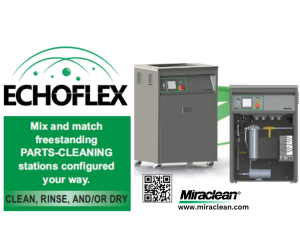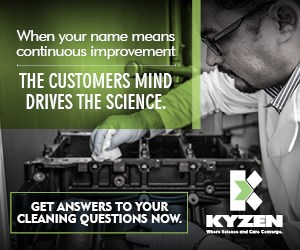Coating Air Conditioner Coils
We are using a two-component paint so we can’t dip the coils because of pot life problems. Any help you can give us will be appreciated.
Coating Coils:
Q: We are an air conditioner equipment manufacturer. We are applying a liquid coating on air conditioner coils using an airless spray gun. The problem is that only the external surface is covered by the paint. Very little paint is getting inside and coating the coil fins. We are using a two-component paint so we can’t dip the coils because of pot life problems. Any help you can give us will be appreciated.
A: Just like skinning a cat, there’s more than one way to coat an air conditioner coil. Since your way is not working, let’s look at alternatives. Air or airless electrostatic liquid spraying may provide more coverage to the fins on air conditioner coils provided there are not too many rows of coils. Another alternative would be electrostatic spray powder coating. If conventionally charged powder spray guns do not provide coverage, perhaps tribocharged guns will. In any event, the aforementioned alternative coating methods are worth trying.
Electrocoating:
Q: I hold the position of electrocoat product manager for a paint supplier and would like to discuss with you the use of electrocoat in this marketplace, both current and future.
Q: In your answer above you failed to mention the only two methods for coating air conditioning coils that will really work. No known spray system, either electrostatic liquid or powder, will coat a coil that is more than one row deep. We are an OEM manufacturer of HVAC/R coils and do our own painting. We have had all major paint and paint equipment manufacturers try this application. Only liquid dip or electrocoat can coat tight fins or coils more than one row deep. Yes, electrostatic liquid or powder may coat very wide fin spaced coils that are more than one row deep, but the paint is so thick that the coil loses its heat transfer efficiency. However, even then, the coil may not be coated in the middle. Consultants with answers like your September answer make it very hard for manufacturing people to convince upper management (who knows nothing about painting) that powder is not always the answer to everything. However, I do usually enjoy your articles. Keep writing. My problem is convincing management that you need a clean substrate to get a good quality finish.
A: You are both right. The electrocoat process will certainly apply paint to the second, third and other rows of coils in heat exchangers. Simple dipping will also work, provided there is not too much solvent reflux.
Costs are always important in finishing operations. You must finish sufficient numbers of product to justify the costs of an electrocoat system. The alternative to buying such a system is sending coils to a custom coater for painting.















